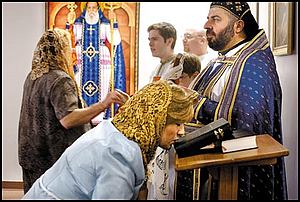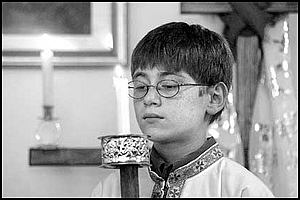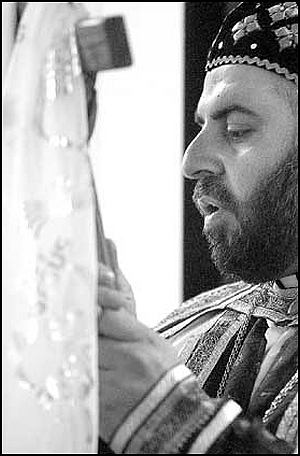
Michelle Christenso
/Caller- Times

Hala Ghably kisses the Bible at the end of Mass at St. James of
Nisibin Syrian Orthodox Church in Flour Bluff. The congregation
recently opened its first church in Corpus Christi. They use
three languages in their services: English, Arabic and Aramaic,
the ancient language that Jesus Christ and his disciples spoke.

Michelle Christenson/ Caller -Times

Altar boy David Ghably, 11, stands in front of the congregation
with a candle. Archbishop Cyril Aphrem Karim said that the faith,
like many others, is struggling to keep young people's interest
in the old ways.

Michelle Christenson/
Caller-Times

The Very Rev. Father Mouris Amsih leads the Mass. Amsih, based
in Illinois, and another priest commuting from New Jersey,
alternate duties at the Corpus Christi parish. |
The
Words of Jesus
'It was Christ's language and the language
of the disciples. Christ gave us the Lord's praise in Aramaic, so
that is the language we use to give him praise,' says a member of a
new Syrian Orthodox congregation in Corpus Christi
By Venessa Santos-Garza Caller-Times
June 15, 2003
Joseph Afram left Syria 28 years ago but
refused to leave behind its traditions. Each weekend he joins the
congregation of St. James of Nisibin Church to pray in Aramaic, a
language spoken by Jesus and passed down from generation to
generation for centuries.
"It was Christ's language and the language of the disciples," he
said. "Christ gave us the Lord's praise in Aramaic, so that is the
language we use to give him praise."
St. James, one of only 20 parishes in the Archdiocese of the
Syrian Orthodox Church of the Eastern United States and the only one
in Texas (other Syrian Orthodox dioceses have churches elsewhere in
the state), began celebrating Mass with five families in a small
shopping center in Flour Bluff in January. Since then the church
attendance has grown to 17 families, with some coming from as far as
the Rio Grande Valley and Houston, Afram said.
"At first we were taking turns having services at different
people's homes," said Afram, church council president and founding
member. "God willing, we will have a permanent building soon."
The diocese got its start in the United States in the late 1800s
and consecrated its first church in 1923 in New York. Over the years,
more and more members of Syrian Orthodox Christianity have relocated
in the United States.
According to the archdiocese, members of the Antiochian Syrian
Church represent the direct descendants of the original inhabitants
of Syria, Lebanon, Palestine, Asia Minor, as well as Upper and Lower
Mesopotamia - today's Iraq. Their language, Syriac-Aramaic - Aramaic
for short - was the language of ancient Syria and the language of
Jesus Christ.
During the Fourth Ecumenical Council in 431 A.D., a fiery debate
about the nature of Jesus caused a split between the Christian
churches. Members of the Syrian Orthodox Church believed that Jesus
had only one divine nature. Others such as the Roman Catholics and
Greek Orthodox argued that Jesus had two natures: human and divine.
There were arguments over the definition of the word "nature" and
the Syriac church believed that the term "two natures" implied that
Jesus had two personalities, one a divine individual and another a
human individual.
For the Roman Catholics and Greek Orthodox, the term nature was
defined more as essence, meaning that both characteristics were
present in the incarnate Jesus Christ.
The Syrians, who refused to accept the canon of the Fourth
Ecumenical Council, were persecuted by the Byzantine Empire and
forced to endure years of bans, killings and incarceration. Many
fled to the Persian Empire in south Mesopotamia but were persecuted
there because of their faith and because their spiritual leadership
resided in the hostile Byzantine Empire. In the centuries since,
Christians of all kinds have suffered prejudice and persecution that
continues today.
"It has been difficult we have been persecuted by Greeks, and
then when Islam arrived the Mongols who moved through killed
thousands we did our best to survive as a community and as a faith,"
said Archbishop Cyril Aphrem Karim of the Archdiocese of the Syrian
Orthodox Church for the Eastern United States. "Many died to
preserve our customs, language and our beliefs because they were
everything to us. They still are."
Seeking religious freedom
Alexander Rentel, who teaches church history and canon law at
St. Vladimir's Orthodox Theological Seminary in Crestwood, N.J.,
said it was that constant abuse that forced many Christians to leave
their homelands in search of religious freedom and settle in places
such as Western Europe and North America. That the people and the
religion have survived is a great display of faith and resilience,
he said.
"They don't necessarily have a homeland but their religion and
their language, above all, are inseparable," Rentel said. "It is
their identity."
Rentel said today's Christians in the Middle East, especially in
Syria, have really been caught in the crossfire. With Saudi Arabia
at one border and Iraq at the other, the country that some consider
a safe haven for many different faiths is sitting in the middle of
controversy and war.
He expects that as the situation continues to escalate more
people will flee, creating a more noticeable presence of Syrian
Orthodox churches in the United States. While the reasons for the
upsurge are unfortunate, he said, Americans will have the
opportunity to be exposed to another form of Christianity.
"To be able to see a church that stretches back that far and has
held onto its traditions and liturgy is amazing," Rentel said.
Trying to preserve a culture
But the Syrian Orthodox Church faces its share of obstacles
in the United States as well. With few churches in the diocese and
little money to support them, congregations are forced to share
priests and pay for much of the day-to-day operational costs on
their own. St. James, for example, has two priests who celebrate
Mass for them on alternating weekends, one commuting from New Jersey
and the other from Chicago.
But the bigger issue, Karim said, is one that all churches of all
nations seem to be battling.
"How do we keep the younger generation, many who were born in the
United States, interested in the old ways and the old language? We
have lived a life of misery, moving from one place to another
because of persecution. Now we have to try to figure out how to
preserve our culture, identity and language in the U.S. They don't
call it the melting pot for nothing."
The diocese hosts a youth camp each year and holds Sunday school
classes in bigger churches to help boost interest. But more and more
churches are incorporating English into their services. St. James
celebrates Mass in Aramaic, Arabic and English.
Raising children in the faith
Egyptian-born Dr. Maged George, a pediatrician who relocated
from Corpus Christi to San Antonio, tries to make the drive here
once a month to attend services at St. James. He said the Syrian
Orthodox Church has close ties to the Coptic Christian church he was
raised in. He has put a lot of miles on his car for his faith, first
driving from Corpus Christi to the Coptic church in San Antonio and
then from San Antonio to Corpus Christi to show support for his
friends here. He said he wants his children, Fadi and Sandra, to
know about the old Coptic and Aramaic languages and their ties to
each other.
"It is extremely important that I raise my children in the same
faith and the same church as I used to attend back home," he said.
Afram said that before St. James, he and his family attended St.
Nicholas Greek Orthodox Church because it was the closest to his
childhood faith. While the church opened its doors to them and did
its best to make them feel welcome, he said he never quite felt at
home. Afram missed the dialect and traditions of his own church.
The building St. James is using, he said, is small and except for
the icons that adorn the walls, doesn't look much like a church.
"The location, the building is not as important to us as our
faith and keeping our heritage alive," he said.
|